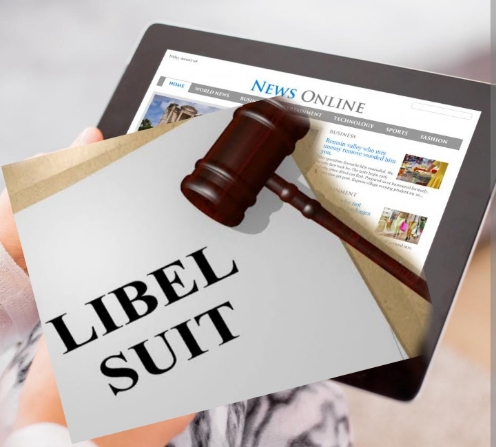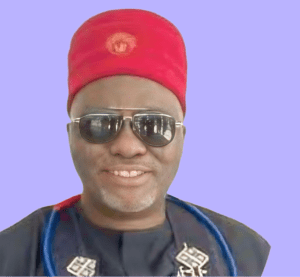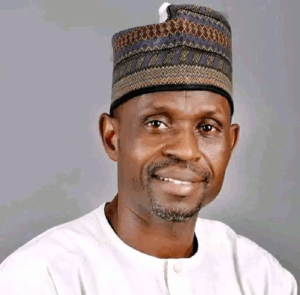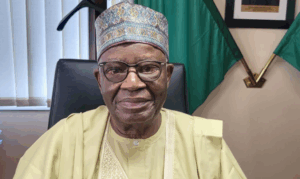Thin Line Between Online Publications/Libel
This post has already been read at least 111201 times!
By Emmanuel Onwubiko
“Where there is discord, may we bring harmony… where there is despair, may we bring hope.’ – Margaret Thatcher.”
The age of the Internet has come with it a lot of new challenges and broader perspectives in the legal terrain in terms of how individuals struggle to keep their reputation from being damaged.
In Nigeria for instance, people who have held or are currently holding public offices have suddenly found themselves battling between the deep blue sea of false or misleading publications and the struggle to untangle the webs of lies woven around what they believe to be their good names.
On many occasions, the former Army chief of Staff who happened to be the longest serving in the history of the Nigeria Army in the person of Lieutenant General Tukur Yusuf Buratai (rtd) has had to battle the online media publishers over allegations that his supporters, lawyers, his colleagues and himself believe to be malicious, mischievous, libelous and outrightly mendacious.
But this gentleman does not seem to be one of those who has explored the angle of seeking the protection of the Court of law which under section 6 has the judicial powers of the Federation.
His observed style has been that he often successfully debunks such malicious and false accusation and then he moves on with his job believing as it were that “he who stops and responds to every dogs that barks at him, he won’t go far”, as one of the Philosophers once stated.
But the Vice President Yemi Osinbajo, Governor Nyesom Wike and a few other current and former public office holders have chosen the path of seeking judicial redress making abundant use of the extant cyber crime Act and the plethora of statutes on libel by media practitioners of all genres to seek what they consider to be redress.
If truth be told, the Online publishers are about the most troubling practitioners that have often found themselves confronting court cases or strong rebuttals. I state this fact because for the past 7 years, I have been an active publisher of an online newspaper with thousands of audiences www.thenigerianinsidernews.com.
Also, aside my personal knowledge, I have just read a part of a beautiful book copyrighted in 2003 written by multiple authors who created a graphic picture of how most persins in Nigeria perceive those in public offices as person’s who are corrupt whether wrongly or rightly.
The multiple Convictions of corruption achieved by the Economic and Financial Crimes Commission and the Independent Corrupt Practices and Other Related Offences Commission have reinforced this public perception.
In one of the chapters the authors wrote as follows-: THE WALLS ARE THE FIRST SIGN ONE HAS STUMBLED UPON THEIR TERRITORY.
High and often topped by fences or razor wire, these walls enclose a variety of buildings: whitewashed villas in the tropics, sprawling haciendas in Latin America, Black Sea dachas in Russia, the odd restored colonial mansion, the occasional faux Mogul Palace.
This diversity may be cause for confusion. But then a gate opens and a gleaming silver Mercedes, windows tinted, speeds out on some urgent errand. And then you are certain. “This home belongs to one of the Wabenzi.”
The authors continued-: “The Wabenzi are an unusual “tribe.
The name was coined by some disgruntled African, tired of seeing wealthy elites racing around in deluxe Mercedes.
And so he dubbed them the “people of the Benz” (or in Swahili: “Wabenzi”). The name traveled to Kenya, Tanzania, South Africa, and points beyond, to describe the rich in those countries, who share a fondness for German luxury cars. (In Nigeria, the same tribe is known as the “Beento,” since they have been to exotic foreign locales on expensive vacations.)”
“Imagine a chance encounter between the proverbial Average citizen of an impoverished country and one of the Wabenzi. A glinting Mercedes flies past a rickety bicycle on a dusty street.
In our simplified world, man on the rickety bike thinks one of two things: “Those Wabenzi are successful. They worked hard for what they have if I do the same that be me, or my children.
Those are the words of a man who believes in the system. David Brooks described the prevalence of just this sort of sentiment in the United States:”Americans… have always had a sense that great opportunities lie just over the horizon, in the next valley, with the next job or the next big thing. None of us is really poor; we’re just pre-rich.”
The writers proceeded thus: “But maybe the chance encounter does not go so well. Perhaps our Average Citizen lives in a country where rags-to-riches stories are not so common or where economic growth has just collapsed, shutting off possibilities for more to get rich.
Perhaps this is a country where all of the Wabenzi are related to the president and the Average Citizen is not.” See the book titled-‘Risk Rules, How Local Politics Threaten the Global Economy’, co-authored by Marvin Zonis, Dan Lefkovitz, Sam Wilkin, and Joseph Yackley.
One online publisher aside Omoyele Sowere of saharareprters.com who has had many legal confrontations with all kinds of African bigmen is Mr. Jackson Ude, the blogger who accused Prof. Yemi Osinbajo of collecting N4 billion from Ibrahim Magu, the suspended acting Chairman of the Economic and Financial Crimes Commission, EFCC.
He, Jackson Ude looked the Vice President in the face and declared that he was not afraid of the Vice President. Ude publishes Pointblancknews.com.
VP Osinbajo had then asked the Inspector-General of Police (IGP), Mohammed Adamu, to investigate allegations that he received N4 billion from Magu.
This was contained in a petition addressed to Adamu through Osinbajo’s lawyer, Taiwo Osipitan and dated July 8, 2020.
The Vice President asked then IGP Adamu to initiate criminal proceedings against Jackson Ude if the allegations are proven to be untrue after investigation.
And reacting to this, Ude said the Nigerian police cannot arrest him and insisted that Osinbajo must first resign as Vice President before dragging him to court.
He said that since the Vice President is denying the allegation, the Presidential Panel investigating Magu and the police, should be compelled to release the verbatim transcripts of Magu’s confessions.
Ude, a former Director of Strategy and Communications under President Goodluck Jonathan administration, Chief, tweeted, “Since Osinbajo, the Star Boy, is denying, let’s have lawyers compel the Presidential Panel investigating Magu and the Police, to release the verbatim transcripts of Magu’s confessions. This is not about waving immunity.
“I am not afraid of Osinbajo and his minions. If he indeed wants to go to court, he needs to resign first, and sue me. He cannot be VP and be using state resources to intimidate the Judiciary. He cannot wave an immunity that he didn’t place. Osinabjo should resign first!
“Osinbajo should have used the U.S Police, FBI or even the CIA to charge me for criminal defamation. Using the Nigerian Police is a waste of poor Nigerian taxpayers money. Except his aim is to arrest me in Nigeria, lock me up forever. Anyway, perhaps Na my ghost dem go arrest.”
Prior to his brush with the Vice President Yemi Osinbajo, the United States based online publisher has had a brush with the then powerful Army Chief Lieutenant General Tukur Yusuf Buratai over unproven allegations linked to corruption which the General vigorously denied and then the Nigerian government cleared him of any charges of corruption.
It must be stated that a year after Buratai left service and has been Nigeria’s Ambassador to Benin Republic, his two successors in the Army have had to publicly give him A CLEAN BILL OF HEALTH as one of the most successful Army chiefs in the annals of the Nigeria Army.
He has a profound clean record of service as stated by the office of the President of Nigeria.
This much was made known when a law firm representing then Chief of Army Staff, Lt. Gen. Tukur Buratai, said the Code of Conduct Bureau had cleared the Army chief of any wrongdoing in the $1.5m properties he (COAS) bought in Dubai, the United Arab Emirates.
In a statement, Buratai’s lawyer, Ugochukwu Osuagwu, advised critics to respect the Army chief’s rights to private family life as guaranteed in Section 34 of the 1999 Constitution of the Federal Republic of Nigeria (as amended).
Also, documents obtained from the CCB indicated that in his asset declaration Form CCB – 1 submitted on August 21, 2015, Buratai declared that the properties in Dubai belong to his wife.
Osuagwu said the military chief didn’t make any false declaration, adding that the said property was not acquired after he became the chief of army staff to warrant the invocation of Section 15 (3) of the CCB Act.
He said, “We view the further attempt by some select few to still dwell on this same Dubai properties and criticise the COAS as a veiled attempt to divert his attention from the current war he is waging to secure the country in various troubled spots in Nigeria.
“Critics are therefore advised to respect the General’s right to private family life as guaranteed under Section 34 of the 1999 Constitution of Nigeria (As Amended) and construct their views within the ambit of the rule of law having been duly cleared by the CCB.
“The COAS complied with Section 15(1) of the Act and included his spouse’s assets in his declarations. That is what the law requires of him and he did not disappoint. The COAS acted lawfully and has not breached any law.”
According to Osuagwu, by a letter dated June 29, 2016, the law firm requested the CCB to clear the air over the said UAE properties.
Osuagwu added, “Without much delay, the CCB responded in its letter dated July 11, 2016, and stated clearly from the asset declaration filed by General Buratai that the said property was duly filed by the Army General and in the spouse’s name.
“Having so declared the property as required of him by law, the Chief of Army Staff has discharged the duty placed on him by the 5th Schedule of the Constitution of the Federal Republic of Nigeria and the CCB and Tribunal Act.”
A copy of the CCB’s response to Buratai’s lawyer, forming the basis of Osuagwu’s assertion, was signed by Mrs. Ijeanuli Arinze Ofor, on behalf of the CCB’s chairman, Mr. Sam Saba.
The letter, titled, ‘Re-Request for information pursuant to Section 1 and 4 Freedom of Information Act 2011’, read, “We refer to your mail dated June 29, 2016, on the above subject matter. We wish to state here that General Tukur Yusuf Buratai, after his appointment as Chief of Army Staff, declared his assets as required by the Constitution of the Federal Republic of Nigeria.
“He was served the Form CCB – 1 on July 21, 2015 and returned same on August 21 2015. We also wish to confirm that his property in Dubai was declared in the wife’s name.
“Please accept the warmest regards of the chairman.”
Jackson Ude waited until the then Army Chief left his powerful military position before he flew another lite of allegations bordering on corruption whilst in service as Army chief. The former Army chief then fired back through his lawyer.
The lawyer aforementioned wrote-:”Your publication titled “HOW BURATAI BEGAN STEALING MILLIONS, CONVETING PROPERTIES 11 DAYS AFTER BECOMING ARMY CHIEF” dated 26.04.2022 is nothing but an attempt to smear the image of RTD LT GENERAL T Y BURATAI, current Nigerian Ambassador to Benin.
Your publication is nothing but a rehash of a rested subject matter: Dubai Properties. The subject matter which you hastily tried to re-post to the public has since over 4 years been put to rest by the Federal Authorities.
The Code of conduct bureau having investigated the matter cleared LT GEN T Y BURATAI of any wrong doing and found him not guilty. So for you to now recklessly bring forth the same matter to the public domain is an attempt to tarnish the image of the retired Army Chief and which you will have to made to account for your indiscretion within the ambit of the Law.
Finally, your attempt to bring up the issue of the existence of Nigerian Army Properties Limited (NAPL) with the CAC registration of RTD LT GEN T Y BURATAI as one of the directors and thus paint a picture of illegality is rather childish. For your information the existence of Nigerian Army Properties Limited (NAPL) is lawful and having the name of the retired Army chief on board is legal.
For your information there are other similar CAC registered entities of the Nigeria Army with such private incorporated status. These are Nigerian Army Post Exchange (NAPEX), and Nigerian Army Small Scale Drug Manufacturing Unit (NASDMU).
Others are Nigerian Army Welfare Insurance Scheme (NAWIS), Post Service Housing Development (PHD) and Post-Service Homes Savings and Loans (PHL).
With these clarifications, it is now clear that your aim was to slur the image of the retired Army Chief. You are therefore urged to retract those defamatory publications.”
It would seem Jackson did not heed the advice of the lawyer and the wait is on to see if a suit on libel would be filed. But one public official currently serving is enmeshed in a court case with Jackson Ude over alleged libel and the matter is happening in a Court based in the United States of America.
A certain news report which Jackson Ude disputes stated that the US judge United States District Court, Eastern District of Pennsylvania, has dismissed the counterclaims of Jackson Ude, publisher of Pointblancknews.com, who is the defendant in the case he has with Simbi Kesiye Wabote, executive secretary of the Nigerian Content Development and Monitoring Board, NCDMB.
The court also granted the motion Wabote brought in his case against Ude in the same court.
The court in United States, US reportedly also ordered Ude to enter into a protective order before Wabote is required to disclose any banking or other personal and sensitive information. It gave Ude December 22, 2021, deadline for completion of fact discovery in the original scheduling order and to file dispositive motions by January 4, 2022, while all other deadlines remain in full force and effect.
He ordered that Ude’s failure to comply with this Order may result in a Show Cause Order or contempt proceedings.
According to court document sighted by Realnews, “Jackson Ude, a former Nigerian citizen now residing in Pennsylvania, owns and maintains a website where he publishes Nigerian news articles. One such article accuses Simbi Kesiye Wabote of accepting bribes and paints him as a corrupt Nigerian government official. Wabote filed suit against Ude in this Court, claiming that the article constitutes defamation.
“From Ude’s perspective, Wabote’s lawsuit is baseless, and its true purpose is to harass Ude. For this reason, Ude filed counterclaims against Wabote alleging abuse of process, intentional infliction of emotional distress, and negligence.
“Both parties then filed motions to dismiss the others’ claims. For the reasons below, the Court denies Ude’s motion and grants Wabote’s motion.”
The court dismissed the counterclaims on November 24, upon consideration of the parties’ letter briefs and after a telephone conference held on November 22, during which both parties presented argument.
The court document sighted by Realnews stated that both Wabote (Plaintiff) and Ude (defendant) were represented by their attorneys Michael D. Cilento and Benneth Onyema Amadi, respectively.
Joseph F. Leeson, Jr., United States District judge, Eastern District of Pennsylvania, who presided over the case, ordered that “The court Plaintiff’s Request .. is moot because Defendant’s counterclaims have been dismissed.” Leeson stated that Ude’s (Plaintiff) Interrogatory is moot because his counterclaims have been dismissed.
Ude’s Motion asserts that this Court lacks subject matter jurisdiction in this case for a variety of reasons. First, it argues that this Court lacks subject matter jurisdiction because Wabote’s injuries occurred in Nigeria.
Second, it argues that this Court lacks subject matter jurisdiction because the Article was not directed at this forum. Third, it argues that this Court lacks subject matter jurisdiction because Wabote did not bring his defamation claim under the ATS.
According to the judge, “These arguments are misplaced; they either go towards personal jurisdiction or are not applicable in this case. Ude’s Motion does not make any arguments that address the true test for whether this Court has subject matter jurisdiction through diversity.”
As a professional journalist of over two decades of experience, I will strongly urge my colleagues to respect the journalistic ethical standards of objectivity, truth, balance and accuracy and whenever a publisher is in doubt, then leave out.
This is because libel if proven has the capacity of denying a publisher any sort of professional reputation.
Let us read what experts in media law has to say on Media practice and Libel and the information is derived from a handout which is based on information from the Associated Press Style and Libel Guide.
The media law experts has this to tell ONLINE PUBLISHERS AND JOURNALISTS GENERALLY-: “If someone writes for publication a defamatory statement (a statement in which a person’s reputation is seriously damaged), and that statement is false, and that person is identified in print, even without a name, then libel charges can be brought.”
Here is Associated Press’s definition of libel: “Libel is the publication of writing, pictures, cartoons, or any other medium that expose a person to public hatred, shame, disgrace, or ridicule, or induce an ill opinion of a person, and are not true.
Actions for libel result mainly from news stories that allege crime, fraud, dishonesty, immoral or dishonorable conduct, or stories that defame the subject professionally, causing financial loss either personally or to a business (Associated Press Style and Libel Guide 251).
To call a person a murderer, a cheat, a child molester, an alcoholic, a liar, a thief, a drug abuser, etc., can be considered grounds for a libel case.
Any accusation that a member of society has violated common standards of ethical behavior can lead to a libel suit. In short, libel is publication of false information about a person that causes injury to that person’s reputation.”
On Libel defense they wrote thus-: “TRUTH is one libel defense. Remember that it is very difficult to prove truth.
FAIR COMMENT is another libel defense.
“The press can write an opinion about the performance of anyone who is a public performer including a politician, athlete, movie celebrity, etc.
“However, if you say something defamatory about that person’s private life, you can be sued. You can say someone is a lousy writer; but, you can’t say the writer is a lousy drunk (unless you can prove it’s true).
“The publication of defamatory matter that consists of comment and opinion, as distinguished from fact, with reference to matters of public interest and concern, provided they do so fairly and with an honest purpose, are not libelous, however severe in their terms, unless they are written maliciously” (Associated Press Style and Libel Guide 251).
MALICIOUS means that the writer knew the information was false and only wrote it to injure the person being written about.
Another libel defense is PRIVILEGE. Privilege applies to libelous statements that may occur during government proceedings or in public documents.
All public proceedings, including court sessions and most public records, are privileged and can be quoted even if they are defamatory.
They, must, however, be quoted in context and not used as a malicious statement used out of context.
In cases regarding public figures, the person who says he was libeled about his public performance, must also prove the libel had malicious intent (reckless disregard for the truth).”
The writers stated also that ANY DEFAMATORY STATEMENT THAT CAN’T BE PROVEN TRUE AND WASN’T TAKEN DIRECTLY FROM A PUBLIC RECORD OR GOVERNMENT PROCEEDING HAS TO BE CONSIDERED DANGEROUS TO PRINT.
In writing about trials and arrests, make sure you check the record. Before the person is found guilty, always use words like “alleged” or “accused.” In America, everyone is considered innocent before proven guilty.
The Right to Privacy: When a person becomes involved in a news event, voluntarily or involuntarily, he forfeits some rights to privacy. Similarly, a person somehow involved in a matter of legitimate public interest, can be written about with safety.
However, a story or a picture that dredges up the sordid details of a person’s past and has no current newsworthiness can be considered libel (The Associated Press Stylebook and Libel Manual 261).
Public figures are generally thought of as people who seek the limelight, who inject themselves into public debate.
The court says that involvement in a crime, even a newsworthy one, does not make one a public figure.
This is important because if you are proven to be a public figure and someone defames your job performance or ethics or whatever, you have to prove libel and you have to prove malicious intent.
If you are a private person, you only have to prove libel, but not malicious intent. Consequently, it’s easier for private citizens to win a libel case than it is for a public figure to win a libel case.”
Perhaps the above fact in the above paragraph may form the reason that Lieutenant General Tukur Yusuf Buratai often prefers to debunk any malicious publications and endeavours to put the perspective that represents the true facts which are accurate, scientific and substantial and then he is not so quick like most others to rush to Court. It is said that in this life, everyone has his own or her own distinctive style.
But obviously, what is universally applicable is the online journalists need to be very professional and stay absolutely away from the troubles of publishing false information maliciously against certain persons just for the fact that it is generally believe that corrupt is a cankerworm in the public spaces of Nigeria but not all public office holders are thieves.
The way our DNA differs and our faces differ so also is the character of everyone.
*Emmanuel Onwubiko is head of the Human Rights Writers Association Of Nigeria (HURIWA) and former National Commissioner of the National Human Rights Commission Of Nigeria. He is a professional journalist.
This post has already been read at least 111201 times!















